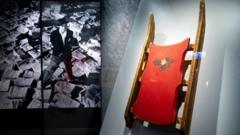One of the world's first calculating machines will not go to auction as scheduled, France, after a Paris court provisionally blocked the historic item from being export.
Auction house Christie's has confirmed it will not proceed with a bid for the machine La Pascaline, developed by the French mathematician Blaise Pascal in 1642.
Valuations suggested the machine could fetch €2 to 3m (£1.77m to £2.65m). Christie's called it the most important scientific instrument ever offered at auction.
Scientists and researchers made a legal appeal to grant heritage protections to the historic instrument, arguing it should be classified as a national treasure.
Pascal was just 19 years old when he developed the earliest version of a calculator, Christie's said. There are only nine of these machines still in existence.
It is the first attempt in history to substitute the human mind with a machine, the official collection description reads.
Its invention marks a breakthrough, a 'quantum leap' whose importance and significance take on a very special meaning today.
La Pascaline was exhibited at Christie's venues in New York and Hong Kong throughout the year.
The machine was included in Christie's auction of the library of the late Catalonia collector Léon Parcé, which also featured Pascal's philosophical piece Pensées and the first printed version of Pascal's wager.
On Wednesday, a Paris administrative court temporarily blocked an earlier export authorisation provided by France's culture minister in May. Two experts had signed off on the minister's certificate, including one from the Louvre Museum.
The judge concluded there were serious doubts over the legality of the certificate, a statement from the Paris court said, adding the decision was provisional until a final judgment is delivered.
In a statement to the AFP news agency, a Christie's spokesperson said: Given the provisional nature of this decision and in accordance with the instructions of its client, Christie's is suspending the sale of La Pascaline.
The court noted La Pascaline's historic and scientific value could qualify as a national treasure guaranteeing protections under the France's heritage code.
French heritage group, Association Sites & Monuments, which was listed as an applicant, welcomed the decision.

















